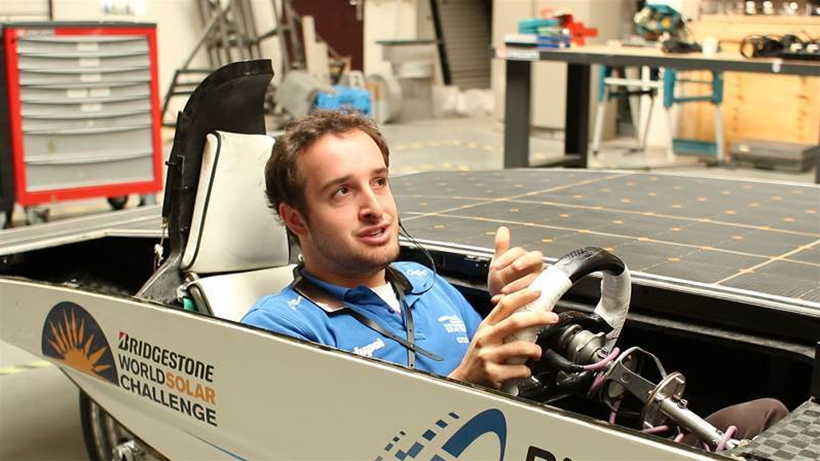Fujitsu’s Ubiquitousware IoT technology for people monitoring helped Belgium’s Punch Powertrain Solar Team take third place in the Challenger Class of the Bridgestone World Solar Challenge – the 3,000km solar-powered vehicle race across Australia held in October.
Fujitsu equipped the Punch Powertrain team with Ubiquitousware wearables for measuring environmental temperature, vital signs and blood flow. These, in combination with the Ubiquitousware cloud software, enabled the team’s support crew to gain insights into the wellbeing of the drivers and their ability to perform under the hot and demanding race conditions, to track drowsiness and to and to determine the optimum time to change drivers.
Vehicles competing in the challenge are allowed to store no more than 5kW hours of energy and must draw all other energy they need to complete the course from the sun, or via the recovery of their vehicle’s kinetic energy.
When vehicles cross the Australian outback — where temperatures can hit 38 degrees Celsius — drivers must find the right balance between using energy for air conditioning to cool the cockpit, and powering their vehicle.
Punch Powertrain driver, Jasper Schrijvers, said: “Driver fitness plays a crucial role in the Bridgestone World Solar Challenge, and it’s important that the driver doesn’t overheat at the wheel, but the use of any cooling at all will slow us down and could mean the difference between winning and losing.”
Fujitsu executive James Maynard said: “Fujitsu wearable solutions have enabled the Belgian team to provide previously unavailable insights into driver well-being — to see more, act faster and predict instead of react.
“The team used data collected during their preparation to advise their drivers on the optimum balance between performance and safety during the race. After all, driver wellbeing is a top priority – not just in events like the Bridgestone World Solar Challenge, but for every driver when behind the wheel or anyone working in physically challenging conditions.”
Fujitsu’ Ubiquitousware was launched in May 2015. It is a package of hardware and software comprising Ubiquitousware core modules, sensors, microcontrollers and wireless communications.
These core modules work in tandem with middleware that uses the sensors to learn and analyse data in the cloud. Sensing data is analysed using the Human-Centric Engine, Fujitsu's set of proprietary algorithms that convert data into information that customers can put to use quickly, for example to detect falls or determine body posture.







